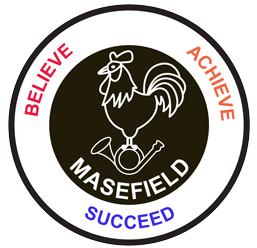Learning and Curriculum
Religious Education
Statement of Intent for Religious Education
The delivery of the Religious Education (RE) curriculum at Masefield is rooted in the belief that it both supports and strengthens what we aim to do in every aspect of school life. Our caring ethos and the value which we place on the development of the whole child; spiritually, morally, socially, culturally and intellectually is reflected in the RE curriculum. At Masefield Religious Education also further supports our commitment to teaching and upholding fundamental British Values.
At Masefield, RE is taught as a discrete subject in order that the development of knowledge and understanding is taught meaningfully and explicitly. Naturally, links are made to other areas of the curriculum but this does not dilute the quality and entitlement of high quality RE teaching.
Religious Education Curriculum
The school’s long term plan for RE follows the guidelines of the Standing Advisory Council on Religious Education (SACRE) for Bolton and sets out the content of teaching within in each year group. This is supported by the school’s RE progression document, which demonstrates learning outcomes within each strand of development within an RE unit. Medium term plans are taken from the locally agreed syllabus and short term planning details how this content is developed over a series of lessons within the unit of work. The organisation of the RE curriculum provides structured opportunities for pupils of any ability and level of development to:
-
acquire and develop knowledge and understanding of principal world faiths practised in Great Britain. These include Buddhism, Christianity, Hinduism, Islam and Judaism, each of which is represented in Bolton;
-
develop an understanding of the influence of beliefs, values and traditions on individuals, communities, societies and cultures, including the local community;
-
develop the ability to make reasoned and informed judgements regarding religious and moral issues with reference to the teachings of the principal religions and non-religious world views;
-
enhance their own spiritual, moral, social and cultural development by:
-
developing awareness of the fundamental questions of life arising from human experiences, and how religious beliefs and practices can relate to them;
-
responding to the fundamental questions of life in the light of their experience and with reference to religious beliefs and practices;
-
reflecting on their own beliefs, values and experiences in the light of their study;
-
expressing their own personal viewpoints in a thoughtful, reasoned and considerate way;
-
recognise the right of people to hold different beliefs within an ethnically and socially diverse society.
-
Religious Education Curriculum
Religious Education Policies
Knowledge Organisers for Religious Education
Below is an example knowledge organiser from each year group for Religious Education:
Year One - Who is Jewish and how do they live?
Year Two - Who is a Muslim and what do they believe?
Year Three - What is the Trinity and why is it important for Christians?
Year Four - What do Hindus believe God is like?
Year Five - How does following God bring freedom and justice?
Year Six - Why do Hindus want to be good?
These are sent home each half term as part of the curriculum overviews. EYFS Knowledge Organisers can be found in the EYFS tab.
High quality texts underpinning our Religious Education curriculum
Religious Education is promoted throughout our core lessons at Masefield which means knowledge and vocabulary is consistently being revisited throughout the curriculum. We use high quality fiction and non-fiction texts to inspire our children to create high quality pieces of writing, encourage the love of reading and embed their Religious Education skills further.
Other Relevant Information
Below you will find more information relevant to the teaching of Religious Education at Masefield Primary School.
